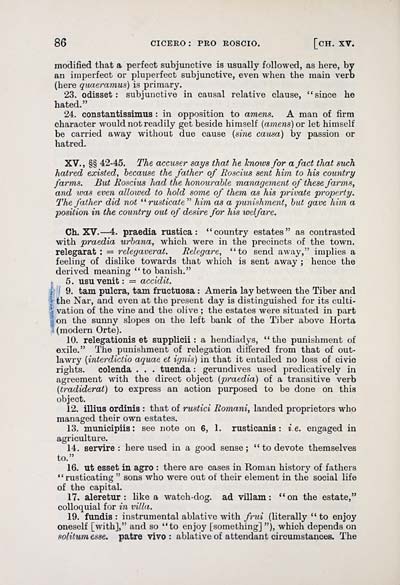Download files
Complete book:
Individual page:
Thumbnail gallery: Grid view | List view

86 CICEEO : PRO EOSCIO. [CH. XV.
modified that a perfect subjunctive is usually foUowed, as here, by
an imperfect or pluperfect subjunctive, even when the main verb
(here qaaeramus) is primary.
23. odisset : subjunctive in causal relative clause, "since he
hated."
24. constantissiinus : in opposition to amens. A man of firm
character would not readily get beside hiraself {amens) or let himself
be carried away without due cause {sine causa) by passion or
hatred.
XV., §§ 42-45. The accuser says that he hnowsfor afact that such
hatred existed, because the father of Roscius sent him to his country
farms. But RosrAus had the honourable management of these farms,
and ivas even allowed to hold some of them as his private property.
Thefather did not "rusticate" hi^n as a punishment, but gave him a
position in the country out of desire for his welfare.
Ch. XV. — 4. praedia rustica : "country estates" as contrasted
witli praedia urbana, which were in the precincts of the town.
relegarat : = relegaverat. Relegare, "to send away," implies a
feeling of disUke towards that which is sent away ; hence the
derived meaning " to banish."
, 5. usuvenit: = accidit.
[; I 9. tam pulcra, tam fructuosa : Ameria lay between the Tiber and
rthe Nar, and even at the present day is distinguished for its culti-
I vation of the vine and the olive ; the estates were situated in part
lon the suimy slopes on the left bank of the Tiber above Horta
' (modern Orte).
10. relegationis et supplicii : a hendiadys, "the punishment of
exile." The punishment of relegation ditfered from that of out-
lawry {interdictio aquae et ignis) in that it entailed no loss of civio
rights. colenda . . . tuenda : gerundives used predicatively in
agreement with the direct object {praedia) of a transitive verb
{tradiderat) to express an action purposed to be done on this
object.
12. illius ordinis : that of rxistici Romani, landed proprietors who
managed their own estates.
13. municipiis: see note on 6, 1. rusticanis : i.e. engaged in
agriculture.
14. servire : here used in a good sense ; " to devote themselves
to."
16. ut esset in agro : there are cases in Roman history of fathers
" rusticating " sons who were out of their element in the social life
of the capital.
17. aleretur : like a watch-dog. ad villam : "on the estate,"
coUoquial for in villa.
19. fundis : instrumental ablative with frui (literally " to enjoy
oneself [with]," and so "to enjoy [something] "), which depends on
solitumesse. patre vivo : ablative of attendant circumstances. The
modified that a perfect subjunctive is usually foUowed, as here, by
an imperfect or pluperfect subjunctive, even when the main verb
(here qaaeramus) is primary.
23. odisset : subjunctive in causal relative clause, "since he
hated."
24. constantissiinus : in opposition to amens. A man of firm
character would not readily get beside hiraself {amens) or let himself
be carried away without due cause {sine causa) by passion or
hatred.
XV., §§ 42-45. The accuser says that he hnowsfor afact that such
hatred existed, because the father of Roscius sent him to his country
farms. But RosrAus had the honourable management of these farms,
and ivas even allowed to hold some of them as his private property.
Thefather did not "rusticate" hi^n as a punishment, but gave him a
position in the country out of desire for his welfare.
Ch. XV. — 4. praedia rustica : "country estates" as contrasted
witli praedia urbana, which were in the precincts of the town.
relegarat : = relegaverat. Relegare, "to send away," implies a
feeling of disUke towards that which is sent away ; hence the
derived meaning " to banish."
, 5. usuvenit: = accidit.
[; I 9. tam pulcra, tam fructuosa : Ameria lay between the Tiber and
rthe Nar, and even at the present day is distinguished for its culti-
I vation of the vine and the olive ; the estates were situated in part
lon the suimy slopes on the left bank of the Tiber above Horta
' (modern Orte).
10. relegationis et supplicii : a hendiadys, "the punishment of
exile." The punishment of relegation ditfered from that of out-
lawry {interdictio aquae et ignis) in that it entailed no loss of civio
rights. colenda . . . tuenda : gerundives used predicatively in
agreement with the direct object {praedia) of a transitive verb
{tradiderat) to express an action purposed to be done on this
object.
12. illius ordinis : that of rxistici Romani, landed proprietors who
managed their own estates.
13. municipiis: see note on 6, 1. rusticanis : i.e. engaged in
agriculture.
14. servire : here used in a good sense ; " to devote themselves
to."
16. ut esset in agro : there are cases in Roman history of fathers
" rusticating " sons who were out of their element in the social life
of the capital.
17. aleretur : like a watch-dog. ad villam : "on the estate,"
coUoquial for in villa.
19. fundis : instrumental ablative with frui (literally " to enjoy
oneself [with]," and so "to enjoy [something] "), which depends on
solitumesse. patre vivo : ablative of attendant circumstances. The
Set display mode to: Large image | Transcription
Images and transcriptions on this page, including medium image downloads, may be used under the Creative Commons Attribution 4.0 International Licence unless otherwise stated. ![]()
| Early Gaelic Book Collections > Matheson Collection > Pro S. Roscio Amerino > (94) |
|---|
| Permanent URL | https://digital.nls.uk/76503366 |
|---|
| Description | Items from a collection of 170 volumes relating to Gaelic matters. Mainly philological works in the Celtic and some non-Celtic languages. Some books extensively annotated by Angus Matheson, the first Professor of Celtic at Glasgow University. |
|---|
| Description | Selected items from five 'Special and Named Printed Collections'. Includes books in Gaelic and other Celtic languages, works about the Gaels, their languages, literature, culture and history. |
|---|

